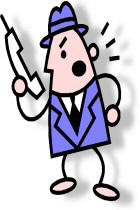 Especially fascinating from the vantage point of a critic, that is. This summer, I was involved in a couple of shitstorms, consisting of nasty backlash in reaction to negative comments I wrote in reviews. The most outrageous was the worst comment, in terms of its vileness and absurdity, that we have ever received here at Ionarts, suggestive of the sort of psyche disturbed enough to shoot Andy Warhol or something. I know that newspaper critics receive this sort of letter, too, but newspapers will publish such reader comments only if they are not written anonymously, and even then not all that often. Well, after initially deciding not to publish it, I was persuaded that, if we did so, it would appear as ridiculous to others as it did to us. That was apparently not the end of it, since the director of the company reviewed in that article, Wolf Trap Opera's Kim Pensinger Witman, has just referred to it again in a recent post. I know there was at least some e-mailing back and forth about the review among people associated with Wolf Trap.
Especially fascinating from the vantage point of a critic, that is. This summer, I was involved in a couple of shitstorms, consisting of nasty backlash in reaction to negative comments I wrote in reviews. The most outrageous was the worst comment, in terms of its vileness and absurdity, that we have ever received here at Ionarts, suggestive of the sort of psyche disturbed enough to shoot Andy Warhol or something. I know that newspaper critics receive this sort of letter, too, but newspapers will publish such reader comments only if they are not written anonymously, and even then not all that often. Well, after initially deciding not to publish it, I was persuaded that, if we did so, it would appear as ridiculous to others as it did to us. That was apparently not the end of it, since the director of the company reviewed in that article, Wolf Trap Opera's Kim Pensinger Witman, has just referred to it again in a recent post. I know there was at least some e-mailing back and forth about the review among people associated with Wolf Trap.As I reread that review of Figaro, I still see it as largely positive. I described the production as a "relative low point" in an otherwise very pleasing season: all our other reviews at Wolf Trap this summer were generally enthusiastic. It's a fine company, doing a great job training young singers and giving them major opportunities. The results are not even, and we tried to note both ups and downs. No comment, as I see it, was ever petty, and none was even all that strident. Merely to say anything negative, in the eyes of these commenters (transparently the friends or supporters of performers criticized), is tantamount to dragging the performer's name through the mud. A minor criticism in my review of the Four Islands recital at Wolf Trap set off another such comment.
Some critics just say nothing about performances that they don't like, choosing only those recordings or concerts about which they can write glowing reviews. This tends to be true more as the profile of the critic increases. In some reviews in the past, I have simply omitted any mention of performers whom I might have criticized. There are many reviews, however, where doing so just seems dishonest. I have read far too many whitewash reviews in major newspapers: readers depend on critics not only to praise good performances but to write critically -- and justly -- when there are problems. When you find a critic whose opinion you share most of the time, he or she is a good guide to follow when you are paying lots of money for concert tickets and alloting precious free time in a busy life to go hear a concert. There is nothing that will surely make me as angry as disliking a performance that someone, a critic or otherwise, has told me was a triumph. If I hear something that I don't like in a performance, I am going to write about it, in a way that I hope is respectful.
Wow, what a hulla-baloo!
ReplyDeleteI think everyone, audience and artist alike, needs to remember that music appreciation is Subjective. This is the same quality of our line of work that makes the directors choose one soprano over another for the job in the first place, when both of them are excellent: they simply like one better. Sometimes the dice fall in our favor, and very often they don't.
"music appreciation is Subjective"
ReplyDelete-- if it were *only* subjective, critics would not exist. There are objective standards (set by the very best) and most people don't meet them (nor are they always expected to)... and there are subjective elements, intangible elements that go beyond those. I don't know the psyche of performers, but I am not sure if confusing the two is terribly helpful.
It's plain obvious, however, that most artists - judged by the most exacting standards - are not terribly good... and young ones often have much to improve upon. But once criticised (and Charles is perhaps exacting but always kind and mild in his reviews and judgements that don't involve PBS) they (their friends) strike back as though they had been mistreated most unjustifiably... as if they had delivered perfection. Or even they know perfection had not been achieved, they come up with tons of excuses why they should never have been held to an exacting standard in the first place.
'tis silly!